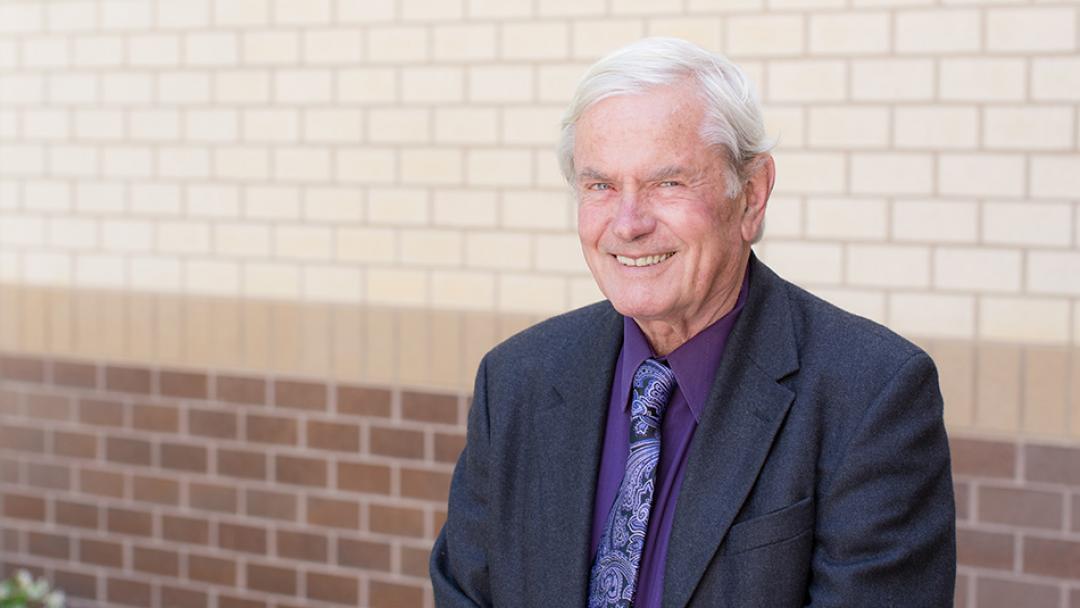An Interview (1971) with Carl Rogers on Nondirectional Teaching
Carl Rogers (Image from Films Media Group)
The interviewer was then Dean of Students and professor of social ecology at UC-Irvine, John M. Whiteley, who, with his mid-centry series of video-recorded interviews where he asks famous psychologists difficult questions, was a YouTube star 20 years before the internet became a common household resource.
In his interview with Rogers, Whiteley wastes no time in getting to the conflict between Rogers and the rest of education. After hearing Rogers explain the bit above about how teaching is futile, Whiteley observes: “Yet our whole educational structure is based on one person teaching another." And he asks, "Why is that?”

Picture of Whiteley 50 years after his interview with Rogers (Image from UC-I)
Rogers's response: “I suppose that’s why I am so deeply opposed to what is going on in our educational system.”
The first few minutes of the interview capture nicely Rogers’s radical approach to education. Whiteley—a young scholar with coiffed hair and collarless t-shirt—delivers with a wry smile a series of difficult questions. Rogers, whose shoulders droop unthreateningly over his grandpa-bod, takes each question squarely, giving his answers in a thoughtful yet tentative way. It is as though Whitely is repeatedly asking Rogers to defend himself, but Rogers only ever explains his opinion of the situation as it makes sense to him on this particular interview day.
It is clear throughout the interview that Rogers is not interested in changing Whiteley’s mind. He is merely being honest, and stating as clearly and as sympathetically his understanding of what seems to be going on between teachers and students. It is apparent in the interview how disarming Rogers’s presence might be to students in a classroom context. Even when challenged directly with nowhere to hide, Rogers never goes on the defensive. He takes seriously every question, no matter how tangential or ridiculous, and therefore honors the questioner.
Religious scholar (and biographer of progressive educator William Heard-Kilpatrick) Samuel Tenenbaum, in an essay about his experience as a student of Rogers, explains how this process occurred in the classroom.
[T]he instructor took many blows; and it seemed to me that many times he appeared to be shaken; and although he was the source of our irritation, we had, strange as it may seem, a great affection for him, for it did not seem right to be angry with a man who was so sympathetic, so sensitive to the feelings and ideas of others. (p. 302 of On Becoming a Person)
Well, I think if we forgot all about teaching and asked, “How do people learn?” and then tried to focus on the issue of what [I could] do to help this person learn something he regards is of real significance for him, then I think we would be on the right track.

¡Qué buen trabajo y me encanta el artículo! Gracias................
ReplyDeleteabogado de trafico de virginia consulta gratis
abogado de tráfico de virginia conducción imprudente
Mantram Nursing Academy offers top PPMET Nursing entrance exam coaching, focusing on subject knowledge, time management, and exam strategies. Our expert faculty, regular mock tests, and personalized mentoring ensure that students excel. Join us for the best coaching and start your journey toward a successful nursing career!
ReplyDeleteTop PPMET Nursing Entrance Exam Coaching
wow
ReplyDeleteCarl Rogers’s perspective on education as expressed in this 1971 interview is both provocative and deeply insightful. His belief that traditional teaching suppresses independent thought challenges the very foundation of most educational systems. I appreciate how Rogers reframes the role of educators—not as transmitters of knowledge, but as facilitators of meaningful learning. His emphasis on empathy, congruence, and positive regard offers a humane, student-centered vision of education. This approach recognizes the individuality of each learner and prioritizes internal motivation over external control. It’s refreshing and relevant, especially in today’s world where critical thinking and self-directed learning are more essential than ever.
ReplyDeleteInterview Platform
Actually, I find this to be a beautiful and useful piece. I discovered the most insightful and helpful information here. A link that says about Momentum College Counseling for High School Students I appreciate you sharing, and I hope you keep doing so.
ReplyDeleteDurante mi trabajo en un proyecto personal, encontré esta herramienta que me ayudó a organizar mis horarios de forma más eficiente, evitando perder tiempo en cálculos manuales.
ReplyDeleteI found this blog very well-written and insightful. The points you’ve shared are practical and easy to relate to. It’s always great to come across content that genuinely adds value. Looking forward to your future updates.
ReplyDeleteDubai Tour Package From Delhi
Bali Tour Package 5 Days 4 Nights
7 days thailand tour package price
¡Qué bueno encontrar artículos como este! La regla de tres parece simple, pero a veces nos liamos más de la cuenta. Yo descubrí https://regladetres-online.es y desde entonces la uso cada vez que necesito hacer un cálculo rápido. ¡Súper útil!
ReplyDeletehttps://ga6789r.net/ là nền tảng đá gà trực tiếp hàng đầu, phát trực tuyến các trận đấu quốc tế đỉnh cao. Với giao diện dễ sử dụng, bảo mật cao.
ReplyDeletehttps://daga88.beer/ là nền tảng đá gà trực tiếp hàng đầu, phát trực tuyến các trận đấu quốc tế đỉnh cao. Với giao diện dễ sử dụng, bảo mật cao.
ReplyDeletehttps://dagatructiepc1.org/ là web xem đá gà trực tiếp Thomo từ bồ gà CPC1, CPC2, CPC3, CPC4,... gồm cựa sắt, cựa dao.
ReplyDeletehttps://bancasieuno.net/ là trò chơi giải trí trực tuyến được hàng triệu game thủ yêu thích nhờ lối chơi hấp dẫn.
ReplyDeletehttps://sv388vip.dev/ – Sân chơi đá gà Thomo trực tuyến an toàn, bảo mật cao. Đăng ký nhanh, hỗ trợ đa nền tảng.
ReplyDeleteGreat read! I appreciate how the article emphasizes inclusive education. Everyone deserves equal access to quality learning and opportunities for growth.Read more info about confidence courses
ReplyDeleteYou wrote this post very carefully.Continuing Education For Nurses The amount of information is stunning and also a gainful article for us. Keep sharing this kind of articles, Thank you.
ReplyDelete